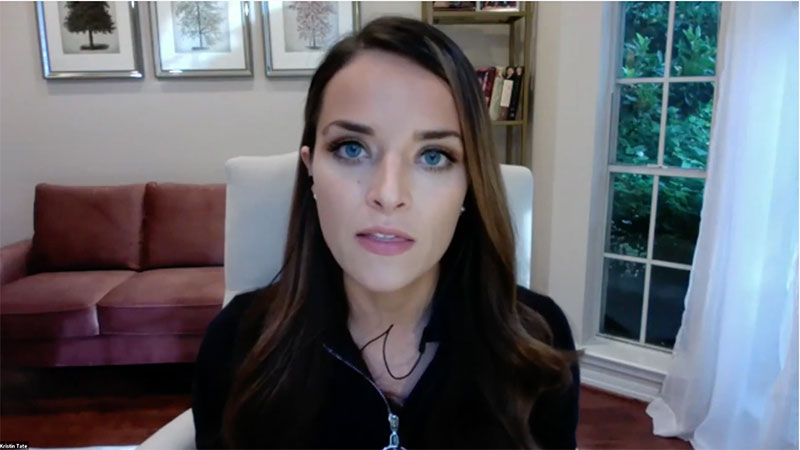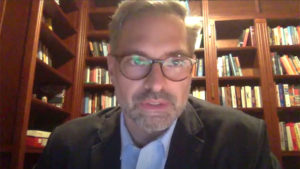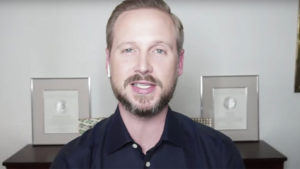
Following the devastating impact of the coronavirus pandemic on both the economy and culture of New York City, TFAS alumni gathered virtually to discuss what’s ahead for the city in the second “Liberty + the Future” lecture.
Professor Paul Glader ’99, ’00 of The King’s College and Executive Director of the Media Project; Townsend Teague ’04, founding and managing member of the Teague Theatrical Group; and journalist and author Kristin Tate, Novak ’19, led the conversation as featured panelists.
Covering COVID-19 News

Professor Glader kicked off the virtual event by acknowledging that though New York is facing unprecedented challenges, the city will recover. He argued that New York City is durable, but the durability depends on competent leadership.
Glader also shared how COVID-19 has impacted the news media by creating temporary spikes in traffic early on, but ultimately created an “economic tsunami of destruction of newsroom jobs” and led to the closure of local publications. For the past ten years, the decline of newspapers has resulted in “news deserts,” which he believes is a severe threat to democracy.
I think a lot of us saw employers traumatized, backing away from internships and hiring in our field and many fields. We saw fewer openings happening in journalism, so we are watching this.” – Paul Glader ’99, ’00
Focusing more closely on New York, Glader reported that more than 3,000 small businesses in New York City had closed their doors for good, eliminating 500,000 jobs so far. Quoting his colleague Dr. Anne Hendershott, he noted that while some businesses have left the city, there will always be newcomers in the years to come. He believes that NYC’s comeback will be linked to competent mayoral leadership and local and state institutions.
“It’s about leadership, and it’s about liberty, in order for the city to see a rebound.”
Recovery of Arts + Entertainment
As an arts development expert and business leader on Broadway, Townsend Teague addressed the need for an arts and culture recovery in order for America to have a full economic recovery. He explained how the arts industry contributes $14.7 billion to the NYC economy each year on top of ticket sales and supports nearly 97,000 jobs.

“Broadway surpassed our combined sports teams in the tri-state area by over 4.6 million in-person attendants in the last season,” he shared.
Teague also emphasized that 62 percent of arts workers reported that they are fully unemployed and 94 percent reported income loss. Millions of arts workers will remain unemployed for the foreseeable future. Teague explained how the arts and culture workforce is in critical danger of collapse, despite out-sized cultural and economic contributions.
“Arts and culture are second in the United States in comparison to other sectors in overall GDP,” Teague shared. “Think about this: it’s five times more the value of GDP than agriculture and forestry.”
Exodus to Suburbia
Kristin Tate closed the discussion by sharing the “perfect storm” of factors that have created an unmatched exodus of families from New York City. As author of “The Liberal Invasion of Red State America,” Tate has spent several years researching how domestic migration trends in the U.S. have impacted the political landscape of the country’s most rural and urban areas.
She explained how the New York City public school system’s failure, high crime rate and increased state and local taxes for NYC residents, along with the economic shutdown, have destroyed the vibrance of ‘The City That Never Sleeps.’
An estimated quarter-million New Yorkers are expected to move upstate for good, and another 2 million will move out of the state altogether. She shared that the majority of those leaving NYC are middle- and upper-income earners, which could be a disaster for New York City’s tax base. Tate added that Mayor Bill de Blasio and Governor Cuomo’s solution includes more taxes for upper-income earners who stay in New York.
“There is also no real recognition that New York City needs its billionaires and millionaires to continue to fund the programs that the poor and working-class rely on every single day,” Tate shared.
Tate also explained how the future of New York City could go in a variety of directions. In the short term, she said, “State and local leaders hope for a government bailout that will not fix the underlying fiscal decay.”
New York City’s rebound could largely depend on whether or not corporations decide to leave as well. With the new “work from home” mentality and the increase in the cost of doing business in New York, it’s possible that more companies will send their high paying jobs out of New York City. Tate shared that the final factor of New York’s rebound is whether or not people will lose confidence in the city.
“The psychological effects of people seeing street after street of shuttered businesses or reading newspaper headlines day in and day out of shootings and crime can be hard to shake for people,” Tate said. “The people who live here need to wake up and vote in favor of competent leadership.”
Following the featured remarks, the alumni panelists answered questions during a lively Q&A session with local alumni and TFAS friends.
To attend the next “Liberty + the Future” event on November 17, please RSVP at TFAS.org/NYCNov20.

